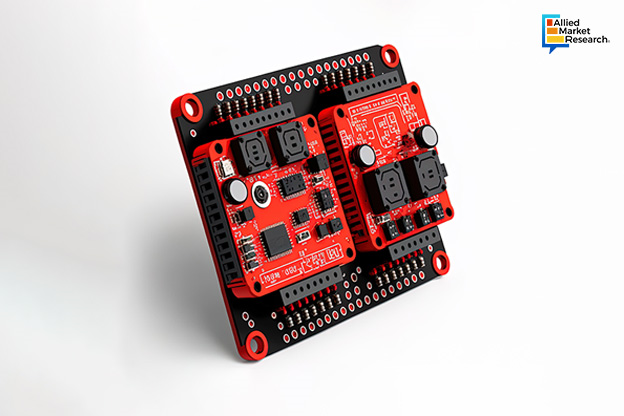How Artificial Intelligence Sensors Have Been Unparallelly Favorable for Industries Globally

13 Oct
2023
In the rapidly evolving realm of technology, Artificial Intelligence (AI) sensors have brought many groundbreaking innovations. These intelligent sensors are revolutionizing various industries, from healthcare to automotive, enabling them to operate smartly. Advanced AI sensors can detect multidimensional information and act as a human-brain-like computational device for data processing. Apart from being smart, these AI sensors also offer a cost-effective approach for a wide range of monitoring applications. This blog includes the vital changes driving the artificial intelligence sensor market, such as new product launches and the beneficial mergers and acquisitions among leading companies.
Latest trends and applications of AI sensors:
As nowadays, the Internet of Things (IoT) is gaining popularity, AI sensors can play a pivotal role in promoting this ecosystem. These AI sensors, when interconnected with IoT devices, can collect, analyze, and share data in real-time and provide more reliable and efficient monitoring of complex tasks. These sensor networks are widely used for smart cities, industrial automation, and even for smart homes. For instance, smart thermostats use AI sensors to learn to manage individuals’ temperature preferences, optimizing energy consumption.
On the contrary, the healthcare industry is also benefiting immensely from AI sensors. Wearable devices with AI sensors can monitor vital signs, detect irregularities, and alert medical professionals in real-time. Additionally, AI sensors in medical imaging enhance the accuracy of diagnoses. They can spot anomalies in X-rays or MRIs that might be overlooked by human eyes. This extraordinary feature of AI sensors can enhance the market’s growth by saving many lives.
Furthermore, the automotive industry is witnessing a paradigm shift with the advent of autonomous vehicles. AI sensors, including LiDAR and radar, are considered the most valuable devices in self-driving cars. These sensors provide a 360-degree view of the vehicle’s surroundings, ensuring safety and precision in navigation. Nevertheless, AI sensors have also made their mark in the agricultural sector by enabling farmers to monitor crops more effectively through drones equipped with AI sensors.
As per a report published by Allied Market Research, the artificial intelligence sensor market is projected to rise at a healthy CAGR of 41.8% over the estimated period from 2023 to 2032.
New product launches:
In response to the growing demand for AI sensors in high-performance predictive maintenance platforms, many leading market players have come up with favorable product launches. A notable instance is the launch of the Smart Motor Sensor - "TMASMS”, by TMEIC Asia Pte. Limited, a leading Japanese provider of industrial systems. This AI-based smart motor sensor is developed to monitor motors and analyze their conditions before their wear and tear and ensure safety and stability in operations at respective sites.
Mergers and acquisitions:
The artificial intelligence sensor market has also undergone a series of mergers and acquisitions among leading companies, shaping the competitive landscape. For example, the acquisition of ACIES, a multinational firm comprising businesses focusing on technology applications by Agilent Technologies Inc., the global company providing instruments, software, and services. This acquisition would bring innovative analysis solutions in lab testing to enhance productivity, efficiency, and accuracy in chromatography and mass spectrometry (GS/MS) platforms through advanced AI sensors.
To sum up, the artificial intelligence sensor market is experiencing prominent growth owing to the increasing adoption of IoT in various fields such as healthcare, smart homes, manufacturing, and many others. Moreover, the growing emphasis on developing sustainable and intelligent urban ecosystems may bring lucrative investment opportunities for the market in the coming age.

Koyel Ghosh
Author’s Bio- Koyel Ghosh is a blogger with a strong passion and enjoys writing in miscellaneous domains, as she believes it lets her explore a wide variety of niches. She has an innate interest in creativity and enjoys experimenting with different writing styles. A writer who never stops imagining, she has been serving the corporate industry for the last five years.
A Brief Overview of the Various Advantages of Carbon Resistors and the Factors Influencing the Rise of the Industry
Avenue: Entire Library membership of Allied Market Research Reports at your disposal
- Avenue is an innovative subscription-based online report database.
- Avail an online access to the entire library of syndicated reports on more than 2,000 niche industries and company profiles on more than 12,000 firms across 11 domains.
- A cost-effective model tailored for entrepreneurs, investors, and students & researchers at universities.
- Request customizations, suggest new reports, and avail analyst support as per your requirements.
- Get an access to the library of reports at any time from any device and anywhere.
Related Post
-
How are Submarine Cables Transforming Global Connectivity with Enhanced User Experience?
-
Endoscopy Procedures: Transformations in Techniques and Applications
-
AI-Powered Video Analytics: How the Product Actually Works for enterprises
-
Painting Robots: Transforming Precision Coating and Creative Applications
-
Innovations in Pharmacovigilance Systems Advancing Patient Safety
-
Understanding Edge Security: Keeping Data Safe Near the Source
-
Exploring the Use and Advancements of 3D Laser Scanners in Professional Applications
-
Reinforcing Industrial Controls with Smarter Tools and Training








